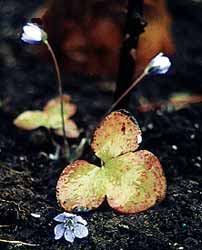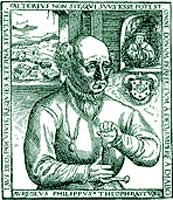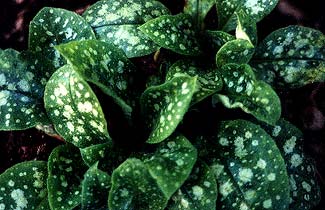
Herbs & the Doctrine of Signatures
"Faith is believing what Reason shows to be untrue."
-Voltaire
I am personally interested in the human health benefits of herbs. When approaching the subject with a sense of science & plausibility, however, the subject of herbal remedies cannot escape intersecting the topic of quackery & fairy tales, since the credible value of a few herbs has led to a marketeering environment for the profitable sale & random use of a hundred additional herbs with no value beyond the placebo effect.
So the subject leads inevitably to my parallel interest in flora mythology, because all too often the heartfelt zealotry attached to the typical use or promulgation of alternative remedies amounts to a belief in the supernatural.
It was once believed, for key example, that Hepatica nobilis or Liverwort was a useful herb in treating liver disorders. There was no basis for this medicinal use beyond notions of sympathetic magic as encompassed by the cult of the "Doctrine of Signatures." Hepatica had no observable effect on the liver & is incapable of reversing or preventing liver dysfunction, yet this belief persisted for centuries.
 The Doctrine of Signatures was dreamed up by Jakob Bohme (1575-1624) who believed that God in His Infinite Wisdom marked every flower & herb with a sign indicative of its value. That Herr Bohme was a shoemaker & neither a physician nor botanist indicates the depth of his inexpertise. His notions came to him in hallucinatory visions, probably induced by sniffing too much shoe glue. I do not jest; the phrase "mad as a hatter" originates in just such glue-sniffing occupations.
The Doctrine of Signatures was dreamed up by Jakob Bohme (1575-1624) who believed that God in His Infinite Wisdom marked every flower & herb with a sign indicative of its value. That Herr Bohme was a shoemaker & neither a physician nor botanist indicates the depth of his inexpertise. His notions came to him in hallucinatory visions, probably induced by sniffing too much shoe glue. I do not jest; the phrase "mad as a hatter" originates in just such glue-sniffing occupations.Herr Bohme, whose portrait is offered at the right, cribbed some of his material from a Swiss alchemist, though he was mainly flying by the seat of his trousers -- or broomstick. He was able to apply his bizarre cosmological, alchemical, & astrological views to every aspect of human existence.
The faux science of this alchemical system became so fashionable that even pioneer botanists like Culpepper began to promote Plant Signatures as medicinally valid. Culpepper went so far as to publicly castigate actual physicians for their failure to embrace alchemy & magic as the ultimate source of good health.
 The idea of the Signatures had been abroad before Bohme, but mainly promulgated within the rarified atmosphere of an international community of European alchemists. One of its earliest advocates was Auroleus Phillipus Theostratus von Hohenheim of Switzerland (1493-1541), who adopted the alchemist name Paraclesus. His portrait is here at the left.
The idea of the Signatures had been abroad before Bohme, but mainly promulgated within the rarified atmosphere of an international community of European alchemists. One of its earliest advocates was Auroleus Phillipus Theostratus von Hohenheim of Switzerland (1493-1541), who adopted the alchemist name Paraclesus. His portrait is here at the left.Paraclesus was already well-versed in alchemy before age 16, by which age he entered the University of Basle to further study advanced alchemical systems such as survived the late Dark Ages & became increasingly ornate & decadent during the Renaissance with the great flourishing of astrology & all manner of occult practices in the royal courts of sundry nations.
After a few years Paraclesus rose to a professorship, but was of such an arrogant nature that fellow alchemists came to despise him. After he had orchestrated a public book-burning of both philosophical & scientific works, in favor of his own alchemical premises as of sole consequence, he was expelled from the university. He was thereafter a wandering mystic whose adventures would make a marvelous epic film combining Lord of the Rings with The Sting, featuring an antihero part flimflam artist & part Gandalf.
After his death, several forged & apocryphal works were ascribed to him, & there has ever since been an effort to make of Paraclesus an intermediate figure between alchemical philosophy, & modern chemistry. But it's a hard shoe to fit, since during his lifetime Paraclesus despised science of any kind that stood outside the philosophical principles of his own increasingly eccentric alchemy, down to & including his advocacy of the burning of scientific works disagreeable to his mystical process.
He remains a great figure in the history of magic & mysticism. His works appealed primarily to fellow mystics, who by turns condemned or embraced him. But it took a humble Shoemaker a generation later to make a bit of it weirdly comprehensible for consumption by the plebian masses.
By the late 1700s the silly ideas promoted as plant Signatures had a powerful foothold throughout Europe & America among quacks of all stripes, some no doubt well-meaning, the majority true charlatans, all equally likely to hang out a shingle & pretend to be physicians, or even avowed combinations of physician & fortune-teller. The effect was that medicine was practiced by astrologers who diagnosed by the stars. For examples, venereal disease was diagnosed by the position of the planet Venus; muscle pains were diagnosed by the position of Mars.
 After the astrological diagnoses was completed, the illness would be treated on the basis of plant "Signatures." At the height of this idiocy, American herbalists convinced themselves God's "mark" on Hepatica was that its leaves turned liver-colored in winter & by a stretch of the imagination looked like little slabs of chicken livers. Ipso facto, hepatica benefits the liver, though the treatment also required knowledge of the position of Jupiter who had authority over the liver & kidney.
After the astrological diagnoses was completed, the illness would be treated on the basis of plant "Signatures." At the height of this idiocy, American herbalists convinced themselves God's "mark" on Hepatica was that its leaves turned liver-colored in winter & by a stretch of the imagination looked like little slabs of chicken livers. Ipso facto, hepatica benefits the liver, though the treatment also required knowledge of the position of Jupiter who had authority over the liver & kidney. Lungwort's common name & genus name Pulmonaria allude to its alleged Signatures value. Because Lungwort's leaves have spots, this is the "Signature" of its curative effect for spotty lung diseases. The Doctrine likewise insisted goldenrod treats yellow jaundice; quaking aspen treats palsy; maidenhair fern cured baldness; & just about any bright red flower was useful for blood diseases.
By this kind of absurd reasoning, we could extend such a ridiculous base of "knowledge" by insisting Pansies with their dandified painted faces bear the Signature of their value in curing homosexuality; Snapdragons are the herb of choice to calm an evil temper; & Lady Slippers flatten bunions.
Rarely has herbal medicine divorced itself quite so utterly from any actual observable effects. Unfortunately, right down to today, many alleged values of herbal remedies are not based on controlled studies & evidence, but are "traditional" uses from the long era of the Signatures cult which never required an observable benefit.
Though herbal lore apart from obsession with Signatures was never quite as reliable as Romance makes of it, neither was it based on a system that intentionally deplored the idea of observable effect, where the supernatural element completely trumped anything that might resemble emperical evidence.
The truer herbal wisdom of midwives having long been dismissed as unholy witchcraft, a far more fanciful witchcraft overseen by male astrologers posing as scientists & physicians was able to progress unimpeded by any actual knowledge of the effects of herbs.
Sad to say, these old ideas do still impact & inhibit the value of health care within the alternative medicine community today, whose practitioners tend still to be no more scientific than the astrologers of yore. Indeed, knowledge of astrology is even today de rigor for alternative medicine practitioners, whose clientele can be no less strident than Culpepper once such magical twaddle is embraced as a matter of faith.
So even though the Doctrine of Signatures may seem a relic of bygone superstitions, modern herbalists frequently aren't the least bit smarter. The purely theosophic practice of homeopathy meets all the criteria of a cult or religion & none of the criteria of science, yet its followers are legion. Smell-therapy assigning specific healing & psychotropic properties to the scents of various flowers & herbs & perfumes has its roots in the Elizabethan poetic symbolism of flowers & is not far removed from floral fairy lore.
Believers in these magical systems, no less than any other type of religious crusader, often appear incapable of rationality, to regard science as the Dark Enemy, except where some finding might be fudged or exaggerated as proof that magic is real.
Because of my writings which acknowledge the healing power of some herbs but reveal the superstitious lunacy at the heart of the greater percentage of what gets sold as herbal medicine, I have been idly threatened with law suits & bodily harm & called all sorts of vile names by true believers who pester me with hate-spewing e-mails. But also now & then I hear from individuals thanking me because their health was saved after encountering a heady dose of reason.
Any crank with a tarot deck, fifty kinds of tea in tinfoil packets, & a lot of powdered garden rubble posing as medicinal herbs, can & do claim medical expertise of all kinds. Devotional clientelle seem constitutionally unwilling to sort out the little bit of fact from the great deal of fancy, as the point does seem chiefly to embrace a mythology foremost.
Nor is the Doctrine of Signatures itself entirely passe. Influential wicca priestess Tamarra James has lately promoted the Doctrine as "the most important mode of medical thinking to have evolved," without even the slightest regard for the system being completely divorced from any degree of medical thinking.
So too one can find loony-tunes medical advice in all sorts of "New Age" herbal remedy books that stubbornly refuse to jettison even the least rational aspects of the lore as having practical applicability. One finds Donna Cunningham in her Flower Remedies Handbook (1992) & Rhonda Pallas Downey in The Complete Book of Flower Essences (2002) embracing the Signatures as valid & deploring science except where it agrees with their own profit-generating promulgation of superstitions. Somehow it is never sufficient to report on curious beliefs; they must be avered to be true.
It is bizarre to the point of pathological how wholeheartedly the "alternate medicine" industry just refuses to separate what has been tested emperically & shown to be at least partially true, from what may yet bear some plausibility though as yet unproven, from what may once have been a testable hypothesis but is long since disproven. This incapacity makes all their advice worthless since anyone actually interested in alternative medicines as more than compendiums of curious beliefs will have to be a hell of a lot smarter than the authors ever are in order to sort it all out.
So one does find believers in (or at least flimflamming promoters of) the Doctrine today espousing alchemy & magic as a suitable alternative form of medical care, even preferring the wildly absurd over the marginally plausible. Frankly, advocates of such frauds should be sued into extinction by everyone who was even transiently stupid enough to rely on their advice, if not just tossed in jail for endangering the health of easy dupes.
In America you can walk into any misnomered "health food store" & look at shelved rows & rows of herbal remedies, a wonderful hypochondrial array of pills & capsules & powders & extracts. These rarely bear any actual promises on the packaging that these products are anything more than food supplements. If the packages were to claim medicinal value, the purveyors could easily be sent to jail or be sued into poverty for telling whoppers that put the public at risk. Even so, if you've forgotten or don't yet know the specific alleged value of each & every herb, there's always a handy counter worker to spew the most amazing nonsense about what each herb is good for.
By this means, an otherwise unemployable check-out teller becomes your defacto physician issuing prescriptions.
Often as not, even in the cases of herbs with well-studied medicinal value, the stale powders sold in stores contain no measurable amounts of the proven active ingredients.
An example is Taheebo, sold powdered as "100% pure," meaning often as not that it is 100% pure sawdust from a Taheebo lumber mill in South America. The stuff sold to herbal hypochondriacs is usually not even the precise species of Taheebo that produces a quinine-like chemical underneath the bark. Despite that the right species could provide an actual medicinal benefit if the product consisted of fresh scrapings from under the bark, the user will never experience that potential quinine effect, because 100% pure millwaste has none of the requisit chemical properties.
Similarly, if some plant does in fact produce flowers, seeds, or roots that contain a potent drug, those "100% pure" powders are often derived from the useless twigs & leaves, or are at least "cut" in potency by including 100% of the plant, besides having been harvested randomly rather than when seasonally potent. Often the valuable part (root or seed) is the only part missing from these powders, because the rootstock & the seeds go to a completely different market higher in the sales chain.
So those shelves & shelves of herbs for sale include: 1) many herbs which have no benefits of any kind in any circumstances; plus 2) a few herbs that in other circumstances might have had a beneficial ingredient, but none in those stale powders; & last of all, 3) there will be a tiny handful of herbs that might actually be helpful for something, but even those are apt to be recommended for entirely the wrong purpose.
The good thing about the worthlessness of the majority of these herbs is how, lacking as they do any active ingredient, they also lack harmful side effects, beyond the side effect of keeping some people form seeking actual medical assistance for treatable ailments.
When an herb like Ma-huang (Ephedra) comes along that really does very quickly clear up congestion, it ends up being misused as a sports stimulant & diet pill causing high blood pressure, heart attack & death, until finally it is banned. A "smarter" herb user who knows the St John's Wort in the health food store is as worthless as dust swept out from under the couch, will instead harvest their own fresh Saint John's Wort, fail to tell their physician about injesting a toxic plant, & end up interfering with the function of prescription drugs so that their illness hastens toward a sorry outcome.
So, given that superstition will never be overcome, that a judicious & knowledgeable use of herbs will forever be the rarest practice, & reliable information will be forsworn in favor of rumors of imaginary values, it's a good thing that health food stores have at least lowered the odds of customers killing themselves, since the vast majority of the products sold derive from 100% pure & harmless garden rubble devoid of any active ingredients. In the minority cases when it is otherwise, & the occasional herb such as Ma-huang is legitimately potent, people tend to hurt themselves with it, no less than they would hurt themselves by randomly self-medicating with an array of prescription drugs.
So the spirit of yesteryear's Doctrine of Signatures is thoroughly alive today. The jargon may change for our generation, but the credibility is no larger.
I have an abiding interest in the Kabbalah, & enjoy some of that humble shoemaker Jakob Bohme's mystical concepts in which one may spot parallels to Kabbalah, Gnosticism, & Tantric Buddhism. These however are meditative & not medical exercises. As points of religion, having faith in the supernatural can be a poetic pleasure & aesthetically enrich the human spirit, as do other forms of art. It is only unfortunate that people insist on dreaming up practical applications for magical premises, & so cause harmfulness & illness in their quest for Health, God, or the All Mighty Dollar.